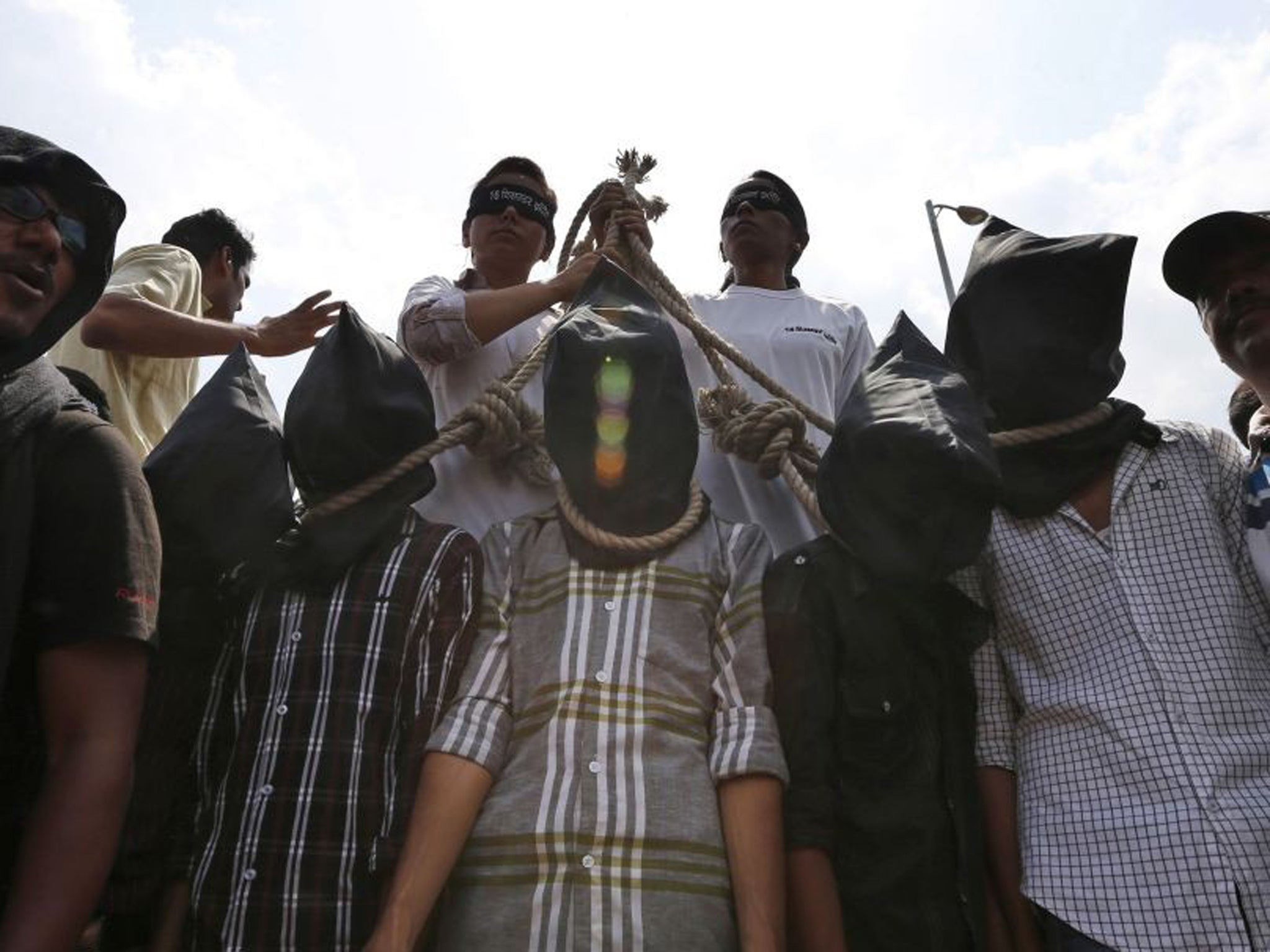Delhi gang-rape: Prosecutors demand death penalty
Four men face either life imprisonment or death penalty over the rape and murder of physiotherapy student last December

Your support helps us to tell the story
From reproductive rights to climate change to Big Tech, The Independent is on the ground when the story is developing. Whether it's investigating the financials of Elon Musk's pro-Trump PAC or producing our latest documentary, 'The A Word', which shines a light on the American women fighting for reproductive rights, we know how important it is to parse out the facts from the messaging.
At such a critical moment in US history, we need reporters on the ground. Your donation allows us to keep sending journalists to speak to both sides of the story.
The Independent is trusted by Americans across the entire political spectrum. And unlike many other quality news outlets, we choose not to lock Americans out of our reporting and analysis with paywalls. We believe quality journalism should be available to everyone, paid for by those who can afford it.
Your support makes all the difference.Prosecutors in India have demanded the death penalty for four men convicted of the gang-rape and murder of an Indian student, saying it was the only possible sentence for such a “diabolical crime”.
A day after the men were found guilty of carrying out the lethal attack on the 23-year-old woman last December, prosecution lawyers said society would lose faith with the justice system if the men were not sent to be hanged.
“The court should give the maximum sentence otherwise the message will go to society that deviance of this nature will be tolerated,” said the chief prosecutor, Dayan Krishnan. “The test is ‘was the collective conscience shocked?'. There can be no better example than this case.”
He added: “The sentence which is appropriate is nothing short of death.”
In the aftermath of the assault, which outraged the country, Indian television channels have led the way in calling for the men to be hanged and the home minister, Sushilkumar Shinde, told reporters that the “death penalty is assured in this case”.
But on Wednesday, lawyers for the four men - bus cleaner Akshay Kumar Singh, gym instructor Vinay Sharma, fruit-seller Pawan Gupta, and Mukesh Singh, who was unemployed – argued that the case did not merit the distinction of “rarest of rare”, the requirement laid down by the Supreme Court for assigning the death penalty.
The four men had all pleaded not guilty. According to the Associated Press, the men stood in the back of the tiny courtroom in T-shirts or short-sleeved polo shirts, unshackled and with policemen holding them from both sides.
They appeared impassive, though it was not clear how much they understood as the lawyers made their arguments. Most of the day’s arguments were in English, which only one of the men, Vinay Sharma, is able to speak. They had no translator. The family of the young woman, who cannot be named for legal reasons, were again in court to witness the proceedings.
Vivek Sharma, a lawyer representing Pawan Gupta, who is aged 19, asked for a sentence of life imprisonment, noting that Indian law calls for execution only in very exceptional cases. He said his client’s young age meant it was possible he could be rehabilitated.
“The court must bear in mind that life imprisonment is the rule and the death sentence is the exception,” he said. “A possibility of his reformation is there.”
VK Anand, who represent Mukesh Singh, said: “He was driving the bus. At best he can be held responsible for aiding the others. He can’t be given death.”
During the seven-month trial, held in a specially established fast-track court, prosecutors said the men had lured the woman and a male friend onto an off-duty bus on the night of 16 December as the pair returned home from watching a movie.
As the men drove the bus through the streets of Delhi, they repeatedly raped and assaulted the 23-year-old with a metal bar before stripping her and her friend naked and throwing them from the vehicle. She died two weeks later in a hospital in Singapore.
After hearing the various arguments, the judge announced that he will deliver the sentence on Friday. In his 237-page judgement, which has been seen by The Independent, the judge found the men guilty of at least 11 counts under the Indian penal code. These ranged from gang-rape and murder to conspiracy and dacoity.
He said the men had all “inflicted numerous injuries on the body of the [victim] including biting her on all parts of her body and inserting iron rods into her...This showed they had the intention to kill her.”
He said: “She was gang-raped by the six persons, one by one, and as her body became devoid of any resistance because of this, the iron rods and hands were inserted into her...All of this was done in a premeditated fashion.”
In the aftermath of the attack, police arrested six males over the crime. One man, Ram Singh, the brother of Mukesh Singh and the alleged ring-leader, was found hanging in his jail cell in March.
The sixth male, who was 17 at the time of the assault and was tried as a juvenile, was found guilty ten days ago and ordered to be detained for three years in a young offenders institution.
Join our commenting forum
Join thought-provoking conversations, follow other Independent readers and see their replies
Comments